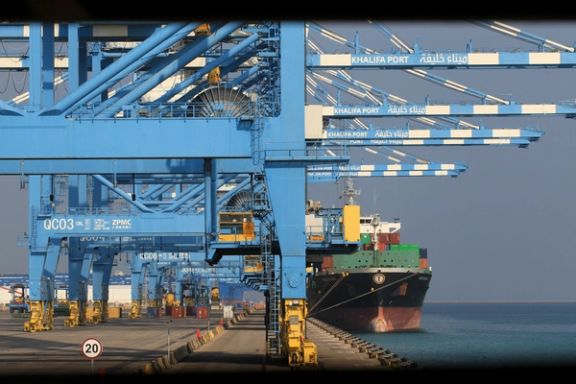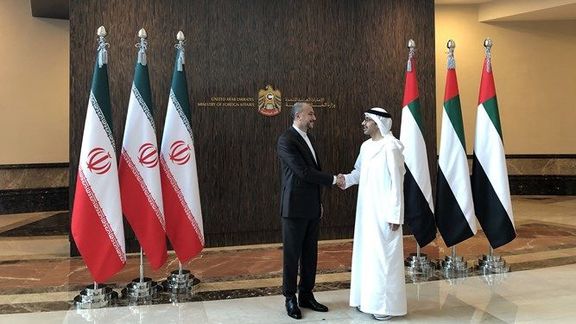Trade Offers Economic Diplomacy Channel Between UAE And Iran

As diplomatic ties between the United Arab Emirates and Iran strengthen, economic and trade ties are also growing.

As diplomatic ties between the United Arab Emirates and Iran strengthen, economic and trade ties are also growing.
The two countries resumed diplomatic relations last year, the UAE sending its ambassador back to Tehran after six years of Cold War style ties.
The UAE downgraded its ties with Iran after Saudi Arabia severed its own relations with Tehran in January 2016. The move followed the storming of the Saudi embassy in Tehran by Iranian protesters after Riyadh executed a prominent Shiite cleric.
After years of animosity on different sides of geo-political rivalries, the UAE started re-engaging with Tehran in 2019 following attacks in Gulf waters and on Saudi energy sites amid heightened tensions after Washington quit global powers' nuclear pact with Iran.
In recent months, the UAE has rolled back limits on corporate registrations and the issuance of visas to companies from Iran, which remains subject to tough US sanctions. Iranian financiers are also exploring how to enhance bilateral trade by creating financial mechanisms to fund legitimate transactions, the Financial Times reported Sunday.

The UAE, a traditional center for re-exports into the Islamic Republic, offers a boon to the two countries’ ties, which continue to be blighted by geopolitical tensions including disputed islands which both claim to be their territory, and Iran’s ongoing nuclear ambitions. Around half a million Iranians live in the country, one of the biggest centres for the Iranian diaspora after the US.
UAE diplomatic outreach to Iran since 2019, in response to attacks on international shipping around the Gulf, has been strengthened by the China-brokered breakthrough this year that re-established relations between the Islamic republic and its traditional foe Saudi Arabia.
China remains the regime’s top trade partner but the UAE is its second, according to The Financial Times, which claims trade between Iran and the UAE has recovered from a pandemic slump of $11bn in 2020/2021 to $24bn in the 12 months ending in March, according to Iranian data.
The increase surpasses the $22bn recorded in 2012 before US-led sanctions started to bite. Iranian officials have said they are now targeting a further increase in bilateral trade towards $30bn in the next two years.
“Pressure from the UAE central bank has decreased and some Emirati banks have started opening bank accounts,” said Masoud Daneshmand, a former head of Iran-UAE chamber of commerce, speaking to the FT.
“Currently, some Iranian companies which used to be in the UAE but had become inactive have become active again. Some new companies have also started business.”
Sanctions against Iran have made the UAE wary, but not so wary as to stop business entirely. Just like their relationship with Russia, the show must go on.
Some Iranian companies and banks have used trustees in the UAE who can act as a proxy for cross-border transactions as a way of sidestepping the current restrictions. “When goods come from Europe and Canada to Iran’s market, an Emirati pays for them and Iranians pay the Emirati,” said Daneshmand, speaking to the FT, which claims even some Iranian banks are now approaching counterparts in the UAE in a bid to formalise the previously grey nature of their business.
However, the UAE’s newfound relationship with Israel, following the 2020 US-brokered Abraham Accords, has also created tensions between the two nations.
The UAE has deployed Israeli missile defense technology to protect against possible attacks, stepping up security in the wake of the country’s worst attack in its history in 2022, when Iranian drones killed three, in the hands of Houthi rebels, an Iran backed proxy in Yemen. The act was retaliation for the UAE’s support of Saudi in the Yemen war.
While the UAE largely remains quiet on sensitive topics on the public stage, in August, Hamad Alkaabi, the UAE's permanent representative to the UN's International Atomic Energy Agency (IAEA), made a rare public voicing "profound concern" regarding Iran's nuclear program and called on Tehran to cooperate fully with United Nations inspectors, stressing that Iran's uranium enrichment activities lacked "realistic peaceful uses.”
In July, Iran summoned Russia's ambassador over the islands dispute following a statement in which Russia and the Gulf Cooperation Council (GCC) issued a statement calling for a “a peaceful solution” to the dispute over the Abu Musa and Greater and Lesser Tunbs islands “in accordance with international law.” The dispute remains a thorn in the side to both countries which both lay claim to the territorial sovereignty.
If trade between the UAE and Israel is anything to go by, economics could well be the path to peace, offering the UAE a position of strength to do soft diplomacy behind the scenes.
Last year private trade between Israel and the UAE reached $2.56 billion, excluding software, putting the UAE at number 16 out of Israel’s 126 trading partners. In the first four months of 2023 trade reached $990 million. The expectation is that this will rise to around $3 billion by the end of the year. Such numbers could only be a dream for Iran, but act as a bitter carrot to Tehran, nonetheless.